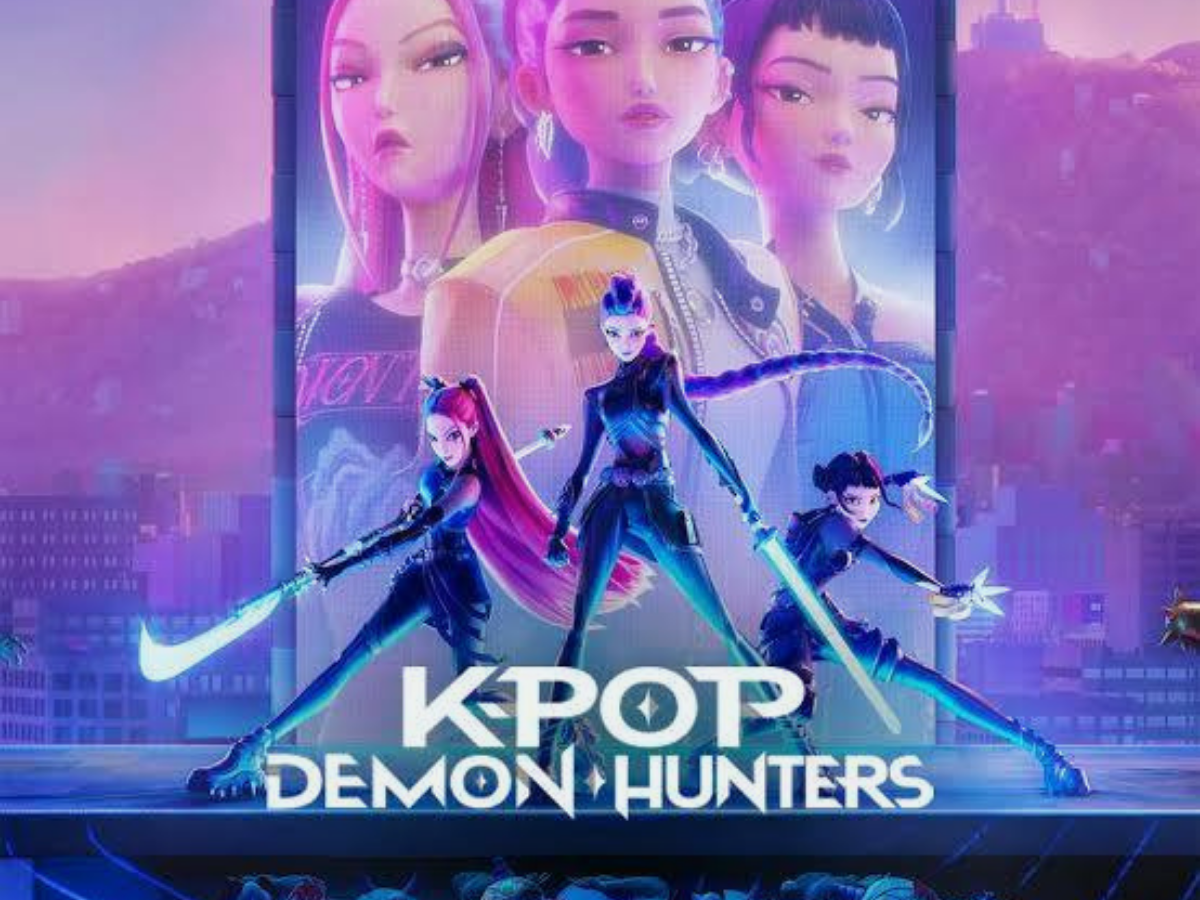There are moments in popular culture that don’t just capture attention—they define what everyone is talking about and set the cultural pulse. To call the Netflix phenomenon KPop Demon Hunters merely “popular” would be a huge understatement. Released on June 20, 2025, it has already become Netflix’s most-watched movie of all time, with 236 million views as of mid-September 2025. The fantasy drama—following a Korean pop group who secretly hunts demons—has amassed over 393.3 million streaming hours, and its soundtrack has exceeded 3 billion global streams. Remarkably, it became the first soundtrack in history to place four songs simultaneously in the Billboard Hot 100 Top 10.
This movie tells the story of a fictional K-pop group that secretly doubles as demon hunters. On the surface, they’re performers with lights, music, and choreography, but behind the scenes they’re fighting supernatural forces that threaten to overtake the world.
It’s not hard to see why this film has captured so much global attention. The combination of Korean pop-culture, high-energy fantasy action, and cinematic spectacle is irresistible. But the movie’s runaway success isn’t just about choreography or stunning visuals. Its heart lies in its characters—their stories, struggles, and growth. Themes like friendship, loyalty, identity, and sacrifice resonate deeply, particularly with teenagers and young adults navigating their own challenges.
KPop Demon Hunters shows how music, story, and community can sweep a generation into something that feels bigger than themselves. Yet for parents and youth ministers, it’s also a reminder: the longings the film taps into—identity, belonging, purpose—are exactly the places where the gospel speaks most powerfully and eternally.
Spiritual Themes and the Battle for Souls
The film is unapologetically spiritual in its core imagery. While it doesn’t point to any single religion, it draws on Shamanistic and Buddhist motifs: demons, spirits, enlightenment, and spiritual warfare. HUNTR/X, the group’s secret identity, protects fans from an unseen spiritual threat—a world poised to consume their souls.
Christians recognize the reality of the spiritual domain, but Scripture offers a clearer, more personal definition than KPop Demon Hunters. Paul writes in Ephesians 6:12:
“For we do not wrestle against flesh and blood, but against the rulers, against the authorities, against the cosmic powers over this present darkness, against the spiritual forces of evil in the heavenly places.”
Where the movie suggests victory comes through training, strategy, and teamwork, the gospel shows a deeper truth: No human effort can overcome the enemy of our souls. Victory has already been secured in Christ. John 3:8 reminds us, “The reason the Son of God appeared was to destroy the works of the devil.” Through the cross and resurrection, Christ has decisively defeated Satan, sin, and death. Even the film’s unique portrayal of song as a powerful weapon hints at a truth the gospel confirms: God uses beauty, creativity, and community—but ultimately through Christ, not human effort, real victory is accomplished.
For parents and youth ministers, this is crucial. Stories like KPop Demon Hunters reveal the spiritual longings of a generation—longings for protection, victory, and light in the face of darkness. Barna Group research shows 60% of Gen Z are increasingly open to God and spiritual matters. As we guide young people, we can acknowledge those longings while pointing them to the ultimate answer: Jesus, who not only inspires but secures the victory we could never achieve on our own.
Identity, Brokenness, and True Transformation
Each of the four main characters—Rumi, Zoey, Mira, and Jinu—grapples with self-constructed identity and personal brokenness. The film portrays transformation as the product of discipline, courage, and relentless self-effort. Rumi pushes herself to complete the Golden Honmoon, even at the cost of her own health. Mira struggles with a sense of rejection from a wealthy but emotionally distant family. Zoey, a Korean-American, feels caught between cultures, echoing Rumi’s internal conflicts. The characters experience success as the reward of human effort, finding self-worth through achievement and perseverance.
The gospel, however, presents a different vision. It acknowledges our brokenness but does not call us to rely on ourselves—or even solely on community—for ultimate solutions. Romans 8:37 testifies, “In all these things we are more than conquerors through him who loved us.” Our identity is not self-made, it is God who establishes his creation and gives us our worth and identity. He redeems our past, restores our hearts, and transforms our lives in ways human effort cannot. The characters in the film fight to maintain their sense of self, but the gospel frees our teenagers from that exhausting cycle. In Christ, we are loved, chosen, forgiven, and made new—our identity anchored in him, not our performance.
This distinction is vital for guiding Gen Z. Growing up as digital natives, teenagers face constant pressure to define themselves according to ever-shifting cultural standards. Stories like KPop Demon Hunters resonate because they mirror the desire to control our identity and destiny. Instead, the gospel invites teenagers to surrender self-reliance and embrace freedom in Christ, where brokenness becomes the canvas for God’s redemptive work.
Sacrifice, Redemption, and the Gospel
Sacrifice drives much of the plot in KPop Demon Hunters. Jinu trades his soul for fame, risking not only himself but his family. The trio Huntrix sacrifices consistently, using their music to maintain the Honmoon seal. Rumi wrestles with shame and fractured identity, discovering her true self through acts of sacrifice. Here, transformation is framed as endurance, courage, and human effort.
These themes resonate because they reflect the true human reality—the weight of brokenness, the longing for redemption, and the courage to give oneself for a greater purpose. But the gospel offers a far deeper hope. Jesus’ sacrifice was not for personal gain; it was for our reconciliation. Romans 5:10 reminds us, “For if while we were enemies we were reconciled to God by the death of his Son, much more, now that we are reconciled, shall we be saved by His life.” Unlike the film’s heroes, Christ’s victory is complete, offering atonement and restoration. Through him, sacrifice is not measured by struggle or performance but by dying and rising with Christ (Rom. 6:4).
Encouragement for Parents and Youth Ministers
Stories like KPop Demon Hunters are cultural mirrors, reflecting the hopes, fears, and longings of a generation. From what I’ve seen, this movie seems to resonate most with middle school and high school students—the same age group that already follows K-pop trends online. I’m not here to tell you whether your child should or shouldn’t watch it—that’s a decision every family makes with prayer and wisdom. But here’s what I would say: if you do allow your kids to watch, don’t let them watch it alone.
Be intentional and engaging as you’re thinking through the themes for the students and even for yourself. Sit with them. Ask questions. Use the story as a springboard to talk about identity, loyalty, and the reality of spiritual battle in light of the gospel. The best benefits is learning how to engage with your students in their world, and in things that they could be interested in and then allowing them to know that parents, leaders, and pastors are processing alongside with them, but are also trustworthy enough to think with wisdom within gospel boundaries.
While teenagers may resonate with the excitement of fame, heroic effort, and fighting evil, we can guide them toward the ultimate source of hope and identity—Jesus Christ. We can affirm their longing for courage, purpose, and transformation while showing that true victory, reconciliation, and restoration come not from what we do, but from what Christ has already accomplished.
For more on KPop Demon Hunters, we hope you’ll listen to the Asian American Parenting Podcast, where Justin spoke with Rooted’s Danny Kwon on this same topic.









